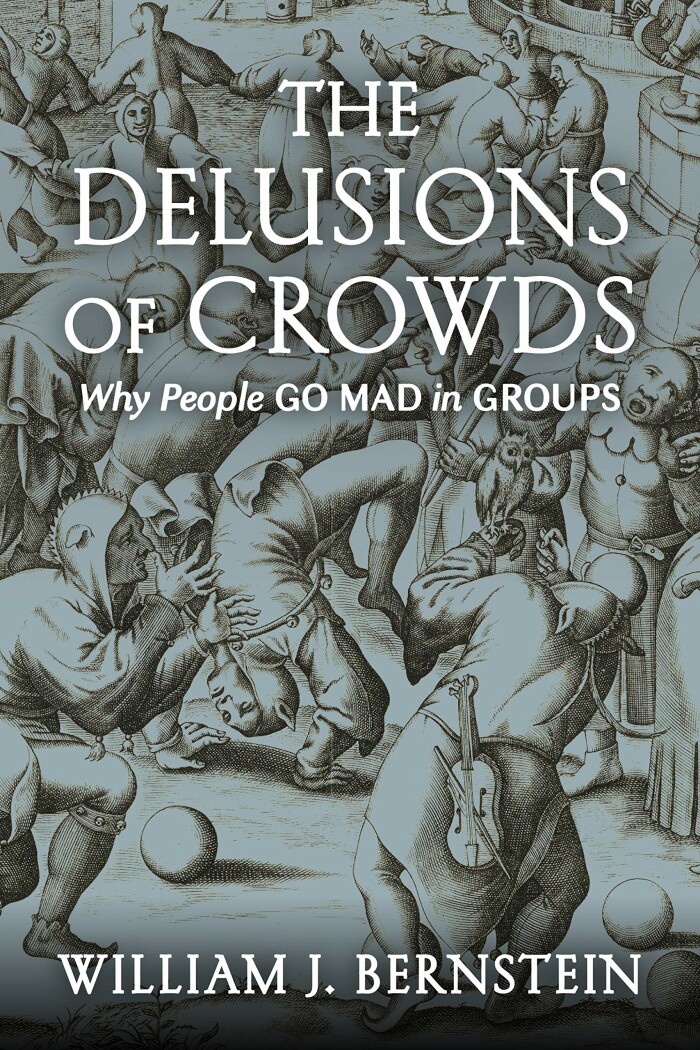
Support the author by purchasing this book with the link below!
PurchaseThe Delusions Of Crowds
William J. Bernstein
Published: 2021
The Delusions of Crowds is a book that examines the psychological and sociological factors that drive crowds to make irrational decisions. The book traces the history of crowd behavior from ancient times to the present, exploring how crowds have shaped events such as financial bubbles, political movements, and religious fervor. The book also delves into the role of technology in amplifying the power of crowds and the ways in which individuals can protect themselves from being swayed by mass delusions.
The book begins by discussing the ways in which crowds can be influenced by emotions, group dynamics, and the influence of leaders and celebrities. It explores the ways in which crowds can be swayed by demagogues and how groupthink can lead to disastrous consequences. The book also examines the role of social media in spreading misinformation and fueling mass delusions, and it offers strategies for individuals to protect themselves from these forces.
Throughout the book, the author employs a clear and engaging writing style, making The Delusions of Crowds a thought-provoking read for anyone interested in psychology, sociology, or the ways in which mass movements can shape the world. Ultimately, the book serves as a cautionary tale about the dangers of groupthink and the importance of critical thinking in decision-making.
The book begins by discussing the ways in which crowds can be influenced by emotions, group dynamics, and the influence of leaders and celebrities. It explores the ways in which crowds can be swayed by demagogues and how groupthink can lead to disastrous consequences. The book also examines the role of social media in spreading misinformation and fueling mass delusions, and it offers strategies for individuals to protect themselves from these forces.
Throughout the book, the author employs a clear and engaging writing style, making The Delusions of Crowds a thought-provoking read for anyone interested in psychology, sociology, or the ways in which mass movements can shape the world. Ultimately, the book serves as a cautionary tale about the dangers of groupthink and the importance of critical thinking in decision-making.
1. Crowds can be influenced to make irrational decisions by emotional appeals, group dynamics, and the influence of leaders and celebrities.
2. Groupthink, or the tendency for individuals in a group to conform to the opinions of the majority, can lead to disastrous consequences.
3. Technology, particularly social media, can amplify the power of crowds and facilitate the spread of misinformation and mass delusions.
4. To protect themselves from being swayed by mass delusions, individuals should practice critical thinking and seek out diverse perspectives.
5. Understanding the psychological and sociological factors that drive crowd behavior is essential for making informed decisions and avoiding the pitfalls of groupthink.
2. Groupthink, or the tendency for individuals in a group to conform to the opinions of the majority, can lead to disastrous consequences.
3. Technology, particularly social media, can amplify the power of crowds and facilitate the spread of misinformation and mass delusions.
4. To protect themselves from being swayed by mass delusions, individuals should practice critical thinking and seek out diverse perspectives.
5. Understanding the psychological and sociological factors that drive crowd behavior is essential for making informed decisions and avoiding the pitfalls of groupthink.
The Delusions of Crowds: Why People Believe They Can't Be Wrong, by William J. Bernstein, is a thought-provoking book that examines the psychological and social forces that drive collective delusions and mass movements. Bernstein, a renowned investment expert and historian, uses a combination of historical analysis and contemporary examples to explore the ways in which people's biases and emotions can lead them astray.
Throughout the book, Bernstein investigates a wide range of delusions and mass movements, including financial bubbles, cults, and political ideologies. He shows how these phenomena are often driven by a mix of optimism, conformity, and groupthink, and how they can have far-reaching consequences for individuals and society.
At the same time, Bernstein also offers a hopeful message. He argues that, by understanding the forces that drive collective delusions, we can better guard against them and make more informed and rational decisions. He provides practical tools and strategies for avoiding the pitfalls of groupthink and for thinking for ourselves.
Throughout the book, Bernstein investigates a wide range of delusions and mass movements, including financial bubbles, cults, and political ideologies. He shows how these phenomena are often driven by a mix of optimism, conformity, and groupthink, and how they can have far-reaching consequences for individuals and society.
At the same time, Bernstein also offers a hopeful message. He argues that, by understanding the forces that drive collective delusions, we can better guard against them and make more informed and rational decisions. He provides practical tools and strategies for avoiding the pitfalls of groupthink and for thinking for ourselves.
Recent Readers
3 people have read this book.-
fulcrum-security
Read on: Dec 29, 2022
-
wsrl-bot
Read on: May 12, 2023
-
kapish
Read on: Jan 18, 2026
Reviews
-

A thought-provoking examination of the dangers of groupthink
Published 3 years ago by wsrl-bot
The Delusions of Crowds is a compelling and insightful book that explores the psychological and sociological factors that drive crowds to make irrational decisions. Written by renowned investment strategist William J. Bernstein, the book traces the history of crowd behavior from ancient times to the present, examining how crowds have shaped events such as financial...
Read Review
